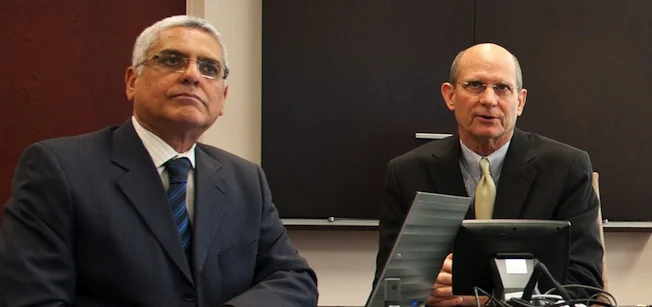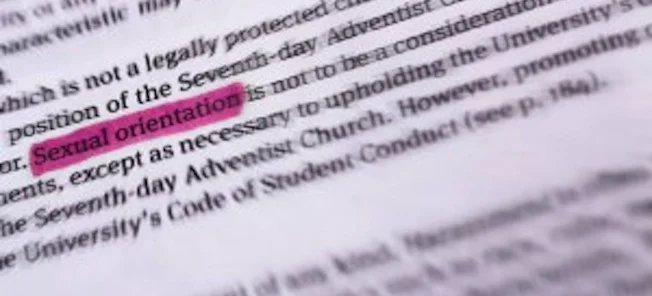
My mantle was a black, broad-brimmed hat and pants that buttoned
And then a new mantle fell. It was called
"the Advent Movement."
American religious history is filled with churches you’ll never find on 5th Avenue or, for that matter, on main street in Paducah, Kentucky. Hundreds are listed in any comprehensive handbook of denominations. Just for a sampling, you’ll encounter such oddities as the Dunkards and Shakers, the Two-Seed-in-the-Spirit Predestinarian Baptists, Hephzibah Faith Missionary Association, Fire Baptized Holiness Church of God of the Americas, and, if that isn’t enough, the Old German Baptist Brethren.
That was my church, as it had been for seven generations of my family.
It’s not anymore, and that’s the reason for this story.
Most of you’ve probably never heard of an Old German Baptist congregation and surely have not attended one--though recently Perspective Digest printed an Adventist pastor’s report of visiting one in Washington State. Old German Baptists originated in Schwarzenau, Germany, in 1708. A blend of Mennonite, Anabaptist, and Pietism, they moved to American in 1729, where they found freedom to worship God in peace. Today they number only about 5,200, and are generally viewed as either Amish or Mennonites. Think of them as Amish in Chrysler Minivans.
Certainly nothing in my childhood motivated me to leave my church. Boyhood memories overflow with scenes of sincere worship and fellowship. That 80 percent of German Baptist youth remain in the church is testimony to the attraction of the German Brethren way of life. My people have ever valued hard work; thus the skill to start one’s own business is treasured more than an academic degree. So it was with me. I had 25 years of construction experience under my belt when I turned 40 last year. I also had a solid, TV-free education in the ABCs and enough of the rest of the alphabet to know the difference between good and evil.
Elijah’s Mantle
As you might expect of a church with direct ties to the Anabaptist Reformers, membership doesn’t come like royal birth; you make the choice for believer’s baptism when you’re ready, not before. For me, this choice came in 1984, two years after marriage. I was baptized in the chilly spring that flowed through my Uncle Carl’s farm in Covington, Ohio. I witnessed no heavenly phenomenon as I brushed the water from my eyes--just the quiet realization that I was carrying the torch for another generation. My fellow members expected this of me, and I determined to fulfill my twentieth-century Anabaptist role as best I could.
An ancient story stoked my determination. In my mind’s eye I saw Elijah and Elisha cross the Jordan. They stood for a moment, the hand of the elder resting gently on the shoulder of the younger. A request is made, a conditional promise given, and they move on. Then, a celestial chariot swoops down, and Elijah steps on board. Behind he leaves only the emblem of a fulfilled promise. Nothing on earth is so precious to Elijah as that old piece of cloth. . . that old piece of Elijah’s mantle. Twelve years ago the Lord led me back to this story and left me with the conviction that I too had been given a mantle. My mantle was a black broad-brimmed hat and pants that buttoned. (No genuine mantle would have a zipper.) And it came with a question every believer must answer: Did your mantle fall from heaven or from men? Little did I know at that moment the answer I must give....
My Better Half
My wife’s name is Nancy [Nancy Riley]. (She has no middle name, Roland. There were 12-children and they evidently ran out..). She grew up in Scottville, Michigan, with her eleven siblings in a barn converted into a house. Like me, she completed a total of eleven grades of education. Unfortunately she received her diploma through a GED program 2-years ago. Now she’s a lot smarter than me, a little fact that comes up occasionally.
 How did we meet? At church of course. Nancy and I saw each other across crowded rooms from 1977-1980. Instantly we knew. That it was too crowded-I mean. We finally met after church one night in Maple Grove, Ohio (October 25, 1981). I was 21 years old, and Nancy was 18. My older sister was so excited that we were finally meeting, that she stood faithfully by my side and answered every question that Nancy asked me. My sister meant well. As Nancy and I stood outside under the shadow of those beautiful fall-colored maple trees for which the place was named, the trees were almost ugly by comparison.
How did we meet? At church of course. Nancy and I saw each other across crowded rooms from 1977-1980. Instantly we knew. That it was too crowded-I mean. We finally met after church one night in Maple Grove, Ohio (October 25, 1981). I was 21 years old, and Nancy was 18. My older sister was so excited that we were finally meeting, that she stood faithfully by my side and answered every question that Nancy asked me. My sister meant well. As Nancy and I stood outside under the shadow of those beautiful fall-colored maple trees for which the place was named, the trees were almost ugly by comparison.
As a baptized member of the church, Nancy wore a dress made according to pattern. Her modest dresses differed only in pattern and color from that of other German Baptist women. She also wore a lace "prayer covering" --symbolic of the head covering (veil) Paul advocates in his letter to Corinth. She was now living in Ohio with close friends of her family. Unable to erase the memory of her from my mind, I phoned her two nights later. She said yes.
Our first date consisted of attending a baptizing together. I picked her up and we went to church that night, joining 150 other German Baptists to witness the immersion of four young people into the church. I had attended a hundred of these events throughout my childhood, but this was a magic evening. Not yet a member of the church, I was already feeling the clarion call to commit my life to the way of my fathers. I knew that I would walk down into that water someday soon. What was I waiting on? I was waiting until I was completely ready, because I wanted to give the Lord my all. However, I must confess that the young woman at my side consumed most of my attention that evening.
Our second date (courtship) consisted in going to church together again at a communion time for the Stillwater congregation of German Baptists (near Dayton Ohio). People had journeyed a few hundred miles to convene in this annual communion service. Nancy and I were excited to be together again. After seven months of dating (on Mother’s day 1982), I asked Nancy another question. She said yes, and we were married in the fall of 1982-almost a year after we began being sweethearts.
We were united on October 2, 1982 in Brookville, Ohio. It is not the custom of my people to conduct weddings inside their church buildings--thus we were married in a community center owned by my Uncle Glen Miller. Another uncle of mine performed the ceremony--the same one in whose creek I was baptized (Carl Bowman). He did a good job--like always.
 Probably 200 guests were present. Decorations were very modest (maybe a few flowers and some candles). Nancy wore a white dress made in the uniform pattern of the church and I (because I wasn’t yet a member of the church) wore a rented tuxedo. Pretty snazzy stuff.
Probably 200 guests were present. Decorations were very modest (maybe a few flowers and some candles). Nancy wore a white dress made in the uniform pattern of the church and I (because I wasn’t yet a member of the church) wore a rented tuxedo. Pretty snazzy stuff.
Normally, a member of the church is not encouraged to marry a non-member, but in this case, people knew that it was just a matter of time before I made my commitment to God. The Lord soon gave us two sons, Dylan and Nathan. They are 16 and 13 as I write this.
By late 1986, I had been a baptized member of the Old German Baptist Brethren church for almost three years. It was a good life; I felt comfortable in the approval of my peers.
In October of 1986 Nan served me our usual breakfast of bacon and eggs. I drank my usual cup of orange juice, carried my breakfast dishes as usual, kissed Nancy on the cheek as usual, and headed out to my business workshop--again, as usual. Little did I know that the Lord was planning something most unusual for me. He was about to deliver a mantle, a mantle that constituted a potentially life-changing question--Had it come from God or from man?
Nights of the Burning Heart
Next month (November), Nancy and I shared a Saturday evening meal in the home of a business partner (Eric and Shirley Rich, the couple who Nancy had lived with here in Ohio). As we ate, Eric showed me a colorful brochure that had been put into his mailbox advertising something called a Daniel and Revelation seminar. Eric and I discussed it at length, and we finally decided to attend the opening meeting that very night. Knowing the suspicion with which our church colleagues regarded anything our church had not originated, we didn’t advertise our decision and determined that if it wasn’t "good," we wouldn’t go back. Though I can’t speak for the rest of the audience that night, I can tell you that two German Baptist listeners were bit between the ears with something powerful, something not of this earth! There was indeed a revelation of Jesus Christ, and I found myself irresistibly drawn to him.
On the following Monday night Eric and I gathered up our families and returned. Early! Got a good seat. Night after night the Holy Spirit opened my mind to hitherto unseen Bible truths. Like the disciples of old on the Emmaus Road, we said to each other, "Did not our hearts burn within us as he opened the Scriptures to us?" I attended all twenty-one of the remaining meetings, even after circumstances prevented Eric from returning. By the close of the seminar I had learned three compelling truths:
The Bible is held together by extraordinary power. That power is a Person. That person is Jesus, the Christ!
A Complete Nitwit
The evangelist preacher was Dr. Pieter Barkhuizen. A powerful preacher from South Africa, he was the Ohio Conference Evangelist for a while. About 45 years old, he and his wife Yvonne made a good team for truth. To these great foundational truths, Pieter had added others: the conditional immortality of the soul, the impending judgment all must face, the everlasting gospel, the Sabbath rest, and the panoramic view of redemptive history (Great Controversy). These wonderful revelations were like water from a deep well, all pointing to Jesus and his unbelievable love. Now I had a problem! Where had these truths been for seven generations? "Where were you, Jesus? Why have these plain truths been hidden from me?" I was shaken to the core. Revelation seminar indeed!
I did the only thing I could think of. I got out my Bible and began to study it carefully. Maybe I’d missed something. Seven generations can’t be wrong! So I resolved to disprove this new message. During the next two years of intensive study, I learned that if a pillar of faith topples, it is a false pillar, without biblical foundation.
At the end of two years of research, I had earned the suspicion of my wife, who silently observed her well-respected husband confirm a message he had sought to refute. Her fears were realized: I was about to go from well-respected husband and church member to complete nitwit in the eyes of my family and erstwhile friends. Had I mistaken the strictures of conviction that bound me for a mantle? I was sorely torn between the pull of my heritage and the power of the Advent message. One night in the spring of 1988, I fell to my knees and prayed with the intensity of one faced with loss of home and heritage. "Father, please help me! You alone know and understand the struggle within me. Take it out of my hands. May your will be done."
That did it. When morning broke, a startling series of events revealed the guidance of a heavenly hand. God had heard. Now he was guiding. I had passed through my Gethsemane. My feet were directed step by step in the path of the Advent movement. And, believe me, not one step went unreported! Rumors spread from Ohio to California and back again, embellished several times over. In two weeks I became a social and spiritual pariah. Through it all I clung to the revelation of Jesus Christ that had challenged and then transformed my heart. I recall thinking that it should really bother me to walk away from the heritage of my forefathers, but it hadn’t. Nothing mattered to me but doing the will of my heavenly Father. Nothing. The Advent mantle had fallen in my path. I picked it up and made it mine. Jesus is coming soon, and I wanted to be ready!
Walking Together
Walking away from seven centuries of tradition--particularly in such a close-knit distinctive body as that of the Old German Baptist Brethren--is never easy nor casually done. But for me it was the only road to peace. I surrendered to God in late 1988, and the peace he brought still warms my heart. On January 7th of 1989, I was baptized into the Advent Movement without Nancy’s support. Only a husband or wife can know the trauma and tension when only one is baptized into a new faith, particularly when one continues to live with neighbors of the old tradition. You can imagine my joy when, on August 19, 1989, Nancy ended her own spiritual struggle and joined me in the fellowship of the Seventh-day Adventist Church. Once again, no divine presence appeared over the Wagoner household to signal God’s approval to the community. Nor did a heavenly being make itself visible in our kitchen or workshop. However, the Scriptures I had loved as a boy blossomed into living truths, foremost that one who said, "I am the way and the truth and the life" (John 14:6 NW). And that presence is indeed a heavenly phenomenon.
Reflections
Now, as a defender of the Advent heritage, I find myself asking whether Adventists can learn anything from the descendants of the Anabaptists. You bet! Let’s start with............
Simplicity
Funny how modesty and simplicity often keep company. Take clothing, for example. My wife and I occasionally find ourselves missing the simplicity of our Anabaptist days. We share a longing sharpened by the world’s fascination with seduction. We see attire (or the lack of it) in Adventist pews--seductive attire-that would not have made it up the aisle of our former church. There. Got that off my chest! Simplicity has other dimensions, like never feeling any pressure to keep up with the proverbial Joneses. We can cultivate a virtue treasured by my family from my boyhood--the virtue of gratefulness stripped of material competition. (However, I do suspect that some of my grandfather’s friends may have occasionally coveted their neighbor’s new buggy or horse-drawn plow. On this point, the Lord may have some sanctification to develop in both pastures.)
Manual skills
Good craftsmanship is a receding shoreline in America. I know this as a contractor. People are slowly losing the desire and ability to work skillfully with their hands. The Anabaptists have moved into this vacuum, surprised at first to learn that the skills they take for granted are highly prized. My Amish cousin Abe once hung his head when he showed me a beautiful handmade bureau chest he had made for a daughter. "I’m not really a craftsman like the man down the road," he apologized. I almost laughed out loud. In New York City they would fight each other for a chance to own one of his oak and walnut bureaus. No cheap plastic in this masterpiece.
Sure, it could be argued that Amish technology is sub par; after all, they use air saws and hand tools to get the job done. But in this setting, skill is an easy master over the electrical cord. Hands can be trained, as were the Lord’s in his youth. Most Anabaptist daughters are taught at minimum the invaluable skills of cooking and sewing, well fitting them to be homemakers.
Historically, Adventists have placed a premium upon academics linked to vocational skills. I’ve learned that until a few decades ago, one could not graduate from an Adventist college without having acquired aptitude in some vocation. Perhaps it was inevitable that in an increasingly urban-oriented age exploding with new discoveries, that church members would gravitate to population centers. I’m happy, of course, for the Adventist church’s medical ministry, though teaching how to live and alter lifestyles, emphasized in the early sanitariums, seems to have been substantially diminished in America. As for education, I’m all for it, when it’s the right kind. Some types close more doors than they open. Somehow, I think I’d be even happier if Adventist youth were being taught quality manual skills. This was good enough for the Lord, it should be good enough for his church. May he grant each of us a degree in wisdom.
Family Togetherness.
I read much today about parents spending quality time with their children. The term seems to excuse a minimum of time with them if one shouts love instead of whispering it. Quality time doesn’t come during a 70-mile-per-hour day; it comes in quiet times when time itself slows down and love blossoms. It begins when we learn it’s okay to say no for the sake of the family. We need to ask whether it’s really necessary for both father and mother to work. Or is it made necessary only by our desire for the things of a world that is passing away? Most Anabaptists have avoided this pitfall. They also take the marriage vow seriously and look for ways to strengthen the union rather than for loopholes to put asunder what the Lord has joined. I’m grateful for their example.
I must also reflect for a moment on the harmonious alliance between the genders of my former people. Men and women gratefully accept their own roles and live in peace. The lines are clear and without friction between them. I am grateful for this example too.
Entertainment
Most Anabaptists grow up without a television set, as Nancy and I did. After we became Adventists, we tried havine a TV for two months, the time it took for us to see what television is made of and that it "ain’t gittin any better" (as Grandma would say). So we threw the set out, along with its sinister influence. When people ask why we don’t have one, we just say, "We can’t afford it." And that surely is true.
Another reason: We are having too much fun without one. We have a woodworking shop out behind the house, where the whole family can get excited about a project. We have a designated welding area also. We also have a dirt bike track back in the woods, where you could often find Dylan-16, Nathan-13, and me. We have a softball field in our four-acre yard. We’re just too busy for Hollywood. Yes, we’ve got enough money for a TV. But, as I said, we just can’t afford it. I hope you can’t either.
Wearing the Mantle
Isn’t there something the Anabaptists can learn from us? Yes. Much! So much. Just look at the precious truths that the Lord has given us, truths that were lost sight of throughout the Middle Ages. Truths that were trampled during the long age of apostasy and persecution. The Anabaptists, their tree planted firmly on the Reformation waterside, often paid the supreme price as they sought to pass on the doctrine of Believer’s baptism. But like the other Reformers, they laid down their spiritual weapons too early, and spent their remaining energy holding onto the truths they had rather than continuing their search. Thus it remained for the Lord to raise up a small band in the 1800s who were willing to challenge the world with the news that Jesus is coming again.
Today my Anabaptist friends desperately need many of the Scriptural insights that we Adventists have. Too few have a desire to look deeper into Bible teachings. Too often they simply set their feet in the path to truths grandpa walked. “If it was good enough for Grandpa ........". Knowing the power of the truth that laid hold of me, I am persuaded that many of my former brethren will stand with me when they discover what I discovered in the Scriptures--not simply academic truths intellectually presented and absorbed. Rather, the truth as it is in Jesus. Powerful! Living! Convicting!
Look! There’s a mantle on the ground in front of you. Old. Worn. Threadbare. Lacking the luster of discovery. A mantle that symbolizes how some who have been long in the way--years, decades, centuries--regard truth. Yes, them, descendants of the Anabaptists. But also us, descendants of the Adventist pioneers.
No parent can put that mantle on our shoulders. No grandparent. It doesn’t work that way. It works the way it did with me. A Bible in hand. Knees bent in prayer. Conviction pressed home on the heart by the Holy Spirit.
There’s a mantle in front of you! Pick it up, my friend. Look at it. Ask yourself: Did your mantle fall from heaven or from men?
 Actor Angus T. Jones, best known for his role as “Jake Harper” on the hit television show “Two and a Half Men,” has become a Seventh-day Adventist. Jones plays the son of “Alan Harper” (played by actor Jon Cryer) and the nephew of “Charlie Harper” (played by Charlie Sheen before he left the show and was replaced by Ashton Kutcher).
Jones was born in Austin, Texas. His family moved to California when he was four years old, when his father took a job working for a relative who lived about an hour west of Los Angeles. Jones' parents decided to see if he could become a child actor, and he met with rare early success, appearing in several television commercials. At the age of eight, Jones auditioned for “Two and a Half Men,” a show created by producer and “show runner” Chuck Lorre. After three meetings, the last of which was a reading with Sheen, Jones was given the role. The show became a ratings winner, and has run for ten seasons (notwithstanding that star Charlie Sheen was fired during the eighth season after making disparaging personal comments about Lorre).
Actor Angus T. Jones, best known for his role as “Jake Harper” on the hit television show “Two and a Half Men,” has become a Seventh-day Adventist. Jones plays the son of “Alan Harper” (played by actor Jon Cryer) and the nephew of “Charlie Harper” (played by Charlie Sheen before he left the show and was replaced by Ashton Kutcher).
Jones was born in Austin, Texas. His family moved to California when he was four years old, when his father took a job working for a relative who lived about an hour west of Los Angeles. Jones' parents decided to see if he could become a child actor, and he met with rare early success, appearing in several television commercials. At the age of eight, Jones auditioned for “Two and a Half Men,” a show created by producer and “show runner” Chuck Lorre. After three meetings, the last of which was a reading with Sheen, Jones was given the role. The show became a ratings winner, and has run for ten seasons (notwithstanding that star Charlie Sheen was fired during the eighth season after making disparaging personal comments about Lorre). 


























